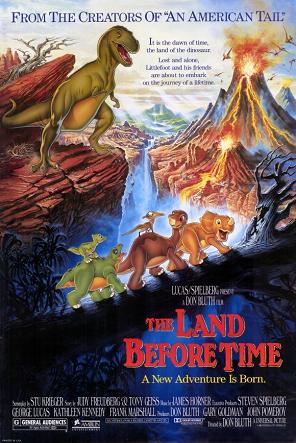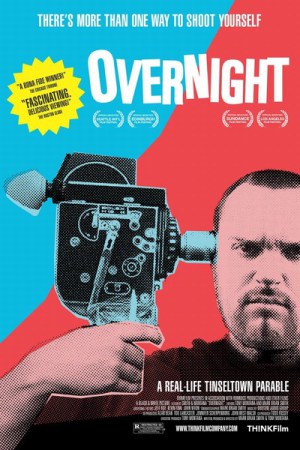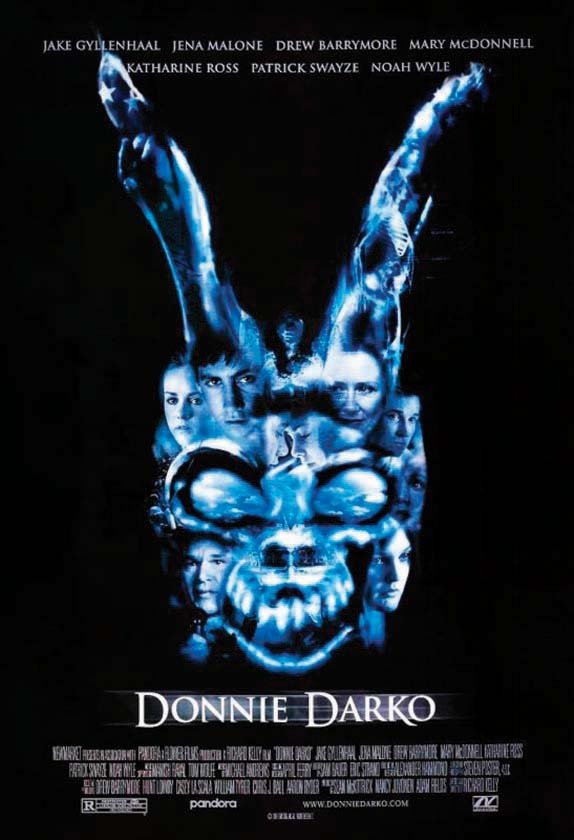
 Recent years have been unkind to the dinosaurs, and unkind to this movie. I think the Cretaceous extinction event is still shooting a few final hoops against them as the clock runs down in 2015. We now know that dinosaurs had feathers. And we know that an apatosaurus, a tricerotops, and a pterodactyl in the same scene makes as much sense as a historical movie in which Cleopatra consults George Washington on the construction of the Great Wall of China. But this movie is still powerful.
Recent years have been unkind to the dinosaurs, and unkind to this movie. I think the Cretaceous extinction event is still shooting a few final hoops against them as the clock runs down in 2015. We now know that dinosaurs had feathers. And we know that an apatosaurus, a tricerotops, and a pterodactyl in the same scene makes as much sense as a historical movie in which Cleopatra consults George Washington on the construction of the Great Wall of China. But this movie is still powerful.
And big. That’s mostly what I remembered – creatures inhabiting a landscape that makes everything seem small. That’s what separates it from Disney’s the Lion King – in this movie, nobody’s the king, and even mighty apex predators often end up behind the eightball. The dinosaurs aren’t masters of their domain, they’re struggling to survive in a changing world. The questing youngsters find a kind of sanctuary at the end, but after their travails it seems a bit mocking – like giving a child a lollipop after open heart surgery. That’s the other thing I remember, the gloom.
Otherwise The Land Before Time can be compared to The Lion King quite a bit – some parts line up shot for shot. Tiny creatures scurrying around gigantic paws. A warped, twisted landscape with a palette to match, full of ochre reds and cinerous grays. The death of a parent as a plot device, and divine intervention from that parent’s spirit to close an open plot parenthesis.
The Land Before Time bears the scars of the moviemaking process – certain scenes seem curiously truncated and brief, as if vital footage was slashed out of the movie with an axe. The whole enterprise seems strangely short – barely longer than an hour. Movies about dinosaurs usually slow down and bask in the experience. This one just has young and vulnerable dinosaurs running from danger to danger, which might stress younger viewers.
It’s probably the second best Don Bluth film, behind Secret of NIMH (whose laurels partly belong to another, as it was adapted from a book). Bluth’s animation studio never succeeded taking much market share from Disney, but they probably opened up animation to a few new people. Disney’s movies from this period are hard to watch as an adult – Bluth’s are not. There’s a nice depth to them: not depth in that they’re saying something profound (every Don Bluth movie can be essentially reduced to a “follow your heart” or “believe in yourself” message), but in that there’s a lot of cinematic space explored: subtle interplays of textures and sounds, and occasional unconventional artistic choices.
On the downside, all the dinosaurs have cutesy names for themselves (long-necks, sharp-teeth, etc), sparing us the indignity of antediluvian creatures uttering Latin phylogenetic classifications at the expense of causing my sister to think that those were the actual names for the dinosaurs.
 It doesn’t take much rope for some people to hang themselves. “Overnight” is a 2003 documentary about someone who hung himself with six inches of empty air. Troy Duffy was a bartender in LA with a screenplay, and he received an opportunity that hardly ever happens to bartenders in LA with a screenplay – a major production and distribution deal from Harvey Weinstein. Thrilled, he immediately hired a couple of local filmmakers to make a documentary about his assured rise to fame and riches. They ended up capturing a Hindenburg disaster on film.
It doesn’t take much rope for some people to hang themselves. “Overnight” is a 2003 documentary about someone who hung himself with six inches of empty air. Troy Duffy was a bartender in LA with a screenplay, and he received an opportunity that hardly ever happens to bartenders in LA with a screenplay – a major production and distribution deal from Harvey Weinstein. Thrilled, he immediately hired a couple of local filmmakers to make a documentary about his assured rise to fame and riches. They ended up capturing a Hindenburg disaster on film.
When aliens land and ask us for positive reasons why we shouldn’t be assimilated, I don’t there’ll be many fingers pointing at Troy Duffy. Arrogant, belligerent, with a tendency for insulting the big-name actors that he’s supposed to be schmoozing, he’s never made a movie before, and hasn’t even been to film school. He brags about showing up to production meetings hungover and wearing last night’s trousers. He has one talent: malapropism. “We’re a cesspool of creativity!” he exclaims. Elsewhere, he schools a naysayer: “Get used to my film career, ‘cuz it ain’t going anywhere.”
His boorish antics land him on Hollywood’s collective shit-list, and soon he receives a call from Weinstein. His film has been put into dreaded “turnaround” mode, halting production until a new deal can be negotiated. When a new offer to pick up the film emerges, its financing is very, very thin. And when the film is made, nobody wants to distribute it.
Another plot thread involves Duffy’s band, The Brood, who received a label deal to score the soundtrack to his film. His bandmates soon come to suspect that Duffy is not sharing his sudden windfall equally. At first Duffy says they don’t deserve a share of the royalties. Then, he moderates his position. “You do deserve it, but you’re not gonna get it.”
Things go from disaster to disaster, with Duffy’s family, co-producers, and bandmates going along for the ride (it’s not their first time dealing with this guy. You think they suspect there’ll be rubbernecking opportunities aplenty). As his projects steadily burn down, there’s endless scenes of Troy either partying or being a jackass. No doubt he fancies himself a work-hard-play-hard type, like Howard Hughes. But he hasn’t actually achieved anything yet. He’s like a runner who wants the champaign popped at the 900m line.
The documentary is fairly narrow in focus. We don’t see the critical moment where Duffy negotiates the film deal in the first place. And it doesn’t delve into the conspiracy theories about why Weinstein took a chance with Duffy, even if only for a figurative moment. It’s been speculated that he never planned to make Duffy’s film, that The Boondock Saints was destined for turnaround since day one, and it was just a PR stunt for his company. Yank a peasant out of the mud, and put a crown on his head. Then, when the cheering crowds are gone, quietly take it away. We don’t know if this is what happened. It’s certainly about as plausible as Weinstein trusting Duffy with millions of his dollars.
Ironically, Duffy’s film has proven to be massively popular on DVD. Unfortunately, he signed a contract that does not make him party to DVD profits.
 It’s one thing to make a movie that relies on secrets and mysteries, never explaining everything – but then you lose the viewer. Something has to make sense. We get tired of being jerked around. Your movie can’t be the equivalent of a child saying “I know something you don’t know!” for 2 hours. The audience won’t hang around for forever.
It’s one thing to make a movie that relies on secrets and mysteries, never explaining everything – but then you lose the viewer. Something has to make sense. We get tired of being jerked around. Your movie can’t be the equivalent of a child saying “I know something you don’t know!” for 2 hours. The audience won’t hang around for forever.
But the other extreme is equally bad, where a movie anxiously contorts itself into a pretzel trying to “make sense”, killing all imagination and wonder in the process. As the line goes, explaining a joke is like dissecting a frog. You understand it better…but the frog dies.
Donnie Darko somehow combines the bad aspects of both, creating a specious dream narrative burdened that somehow possesses the need to literalize itself with scientific explanation.
The premise is tantalising. A troubled young man is called from his room by a figure in a rabbit suit – this apparent saves his life, for a jet engine crashes into his room as soon as he leaves.
The story soon becomes muddled, and the director’s cut merely shines an extra 10 watt bulb into the murk. Donnie has obviously been saved for a reason…but what? It seems time travel is involved. Something about multiple universes. Donnie travels from place to place at the behest of Mr Rabbit Suit, doing various things, but there’s a layer of confusion preventing them us from seeing the higher purpose. It’s like playing an adventure game when you can’t work out what you’re supposed to do, so you just blindly click on everything in sight.
Donnie Darko has style – all kinds of style. But what, ultimately, is it doing? It’s not a departure into the Land of Lynch – the movie obviously has rules, it’s obviously humming along to some hidden tune we can’t hear. It invites logical analysis…but sadly, logical analysis gets turned away at the door. Sorry sir, you aren’t on the guest list.
It does give an unsatisfying, fairly thin scientific non-explanation for the events in the book. The wonderfully creepy atmosphere is immediately dispersed like fart gas when Donnie starts reading about what’s happening in a helpful textbook called The Philosophy of Time Travel. Stupid. Who thought this was a good idea?
Ultimately, we never know the full story of Donnie’s strange experiences. There are fansites dedicated to explaining this movie, especially its profoundly confusing final scenes. Explanations coil around and around on themselves until you’re left with no choice but to think “why even analyse this? It’s a nonsense. There’s no way, given these facts, to arrive at a consistent conclusion.” Normally you can make any bizzaro version of a theory work by adding enough epicycles and equants, but not here. Where, ultimately, does the aircraft engine come from? The real world, or Donnie’s “tangental” one? Neither makes sense. This movie is impervious to reason.
This movie annoyed me to a degree that probably isn’t healthy. I wonder if the director can furnish answers about this movie. Someone should beat it out of him – my suggestion is with a jet engine.

 Recent years have been unkind to the dinosaurs, and unkind to this movie. I think the Cretaceous extinction event is still shooting a few final hoops against them as the clock runs down in 2015. We now know that dinosaurs had feathers. And we know that an apatosaurus, a tricerotops, and a pterodactyl in the same scene makes as much sense as a historical movie in which Cleopatra consults George Washington on the construction of the Great Wall of China. But this movie is still powerful.
Recent years have been unkind to the dinosaurs, and unkind to this movie. I think the Cretaceous extinction event is still shooting a few final hoops against them as the clock runs down in 2015. We now know that dinosaurs had feathers. And we know that an apatosaurus, a tricerotops, and a pterodactyl in the same scene makes as much sense as a historical movie in which Cleopatra consults George Washington on the construction of the Great Wall of China. But this movie is still powerful.

